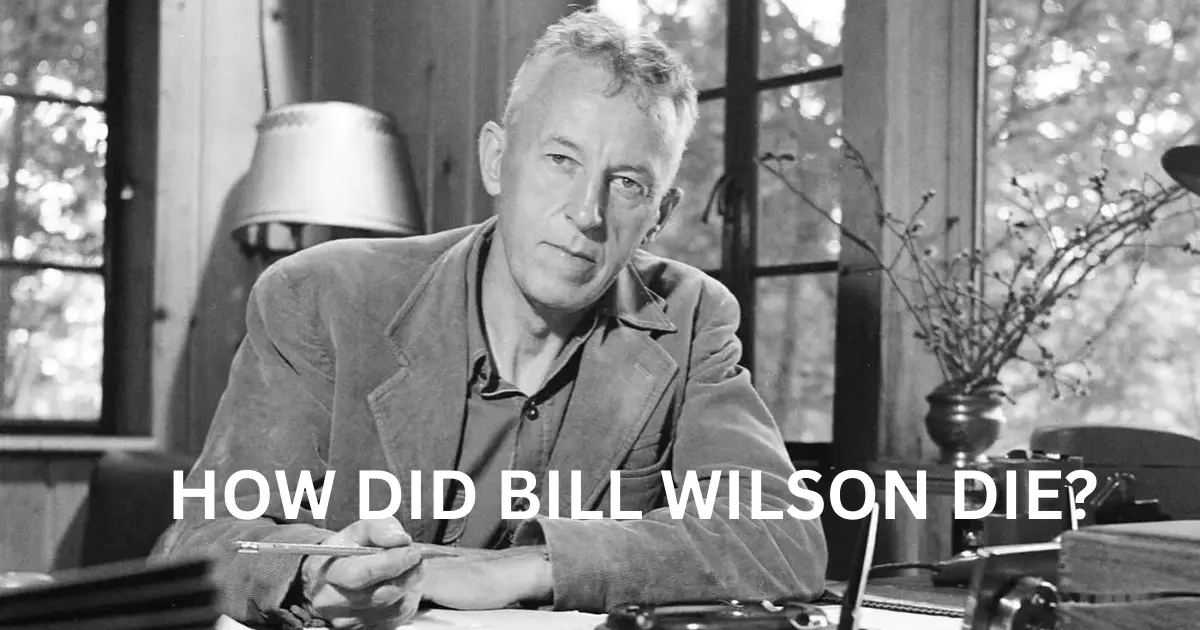Bill Wilson, a name synonymous with hope and recovery for millions worldwide, was the co-founder of Alcoholics Anonymous (AA).His story is one of remarkable transformation, from a man struggling with alcoholism to a beacon of light for countless individuals seeking sobriety.
But how did this influential figure’s journey end? In this article, we’ll take a look at the life and death of Bill Wilson, exploring the causes and circumstances surrounding his passing.
Bill Wilson’s Early Life and Struggles
Born William Griffith Wilson in 1895, Bill Wilson experienced a challenging childhood marked by his parents’ separation and his own struggles with self-doubt.
He found solace in alcohol during his college years, and his dependence grew after serving in World War I. Despite his intelligence and charm, alcoholism began to affect his personal and professional life.
The Road to Recovery and Founding of AA
Wilson’s life took a turn in 1934 when he experienced a profound spiritual awakening that led him to sobriety. This experience, coupled with his encounter with fellow alcoholic Dr. Bob Smith, laid the foundation for Alcoholics Anonymous.
Together, they developed the now-famous Twelve Steps program, a set of guiding principles for achieving and maintaining sobriety.
Bill Wilson’s Legacy
AA grew rapidly, offering a lifeline to those battling alcohol addiction. Wilson dedicated his life to the organization, writing its foundational text, “Alcoholics Anonymous” (often referred to as the “Big Book”), and tirelessly promoting its message of recovery.
How Did Bill Wilson Die?
Despite achieving long-term sobriety, Wilson faced health issues in his later years. He was a heavy smoker throughout his life, a habit that eventually caught up with him. In the late 1960s, he developed emphysema, a serious lung condition that makes breathing difficult.
The Final Days
Wilson’s health deteriorated, and he required an oxygen tank to assist with his breathing. In January 1971, he was flown to the Miami Heart Institute for treatment but sadly passed away en route on January 24, 1971, at the age of 75.
Cause of Death
The primary cause of Bill Wilson’s death was emphysema, complicated by pneumonia.11 His lifelong smoking habit significantly contributed to these conditions.12
Bill Wilson’s Impact on Addiction Treatment
Wilson’s legacy extends far beyond his own personal recovery. AA, the organization he co-founded, has helped millions of people overcome alcohol addiction and continues to be a cornerstone of addiction treatment worldwide.
The Twelve Steps program, with its emphasis on spirituality, community support, and personal accountability, has been adapted for various other addictions, demonstrating its enduring relevance and effectiveness.
A Lasting Impact
Bill Wilson’s story is a testament to the power of recovery and the transformative potential of human connection. Though his life was marked by personal struggles, his dedication to helping others find freedom from addiction has left an indelible mark on the world.
His legacy serves as a reminder that even in the face of adversity, hope and healing are possible.
| Key Events in Bill Wilson’s Life | Date |
|---|---|
| Birth | November 26, 1895 |
| Founding of Alcoholics Anonymous | June 10, 1935 |
| Publication of the “Big Book” | April 10, 1939 |
| Death | January 24, 1971 |
| Health Challenges Faced by Bill Wilson |
|---|
| Alcoholism |
| Emphysema |
| Pneumonia |
FAQs
How old was Bill Wilson when he died?
Bill Wilson was 75 years old when he passed away in 1971.
Where is Bill Wilson buried?
Bill Wilson is buried in East Dorset, Vermont.
Did Bill Wilson ever relapse?
While Bill Wilson struggled with alcohol cravings throughout his life, he maintained sobriety from December 1934 until his death in 1971.
What is Bill Wilson most known for?
Bill Wilson is best known as the co-founder of Alcoholics Anonymous (AA).
What were some of Bill Wilson’s other interests?
Besides his work with AA, Bill Wilson was interested in spirituality, philosophy, and social causes. He also explored alternative therapies for mental health.
